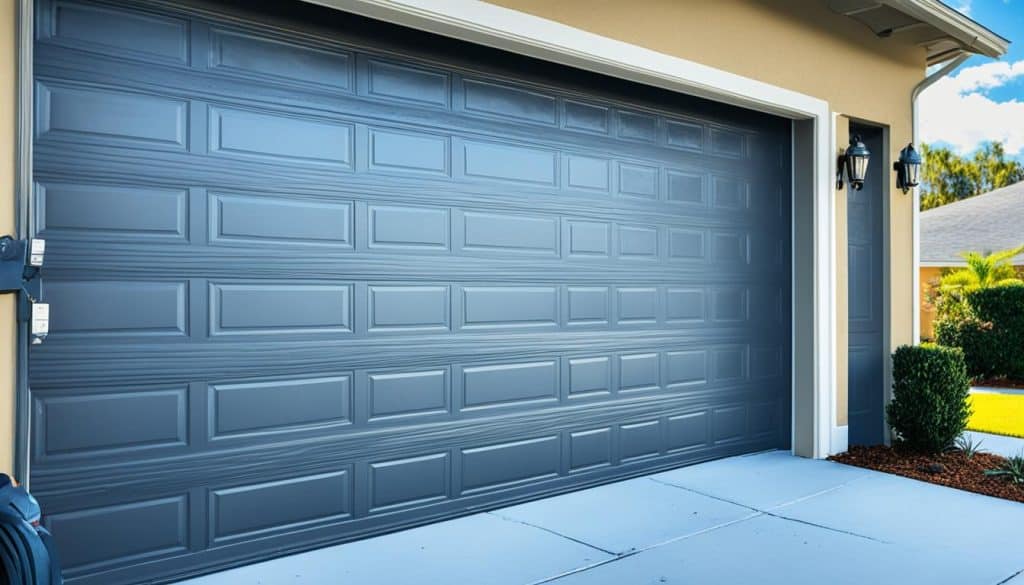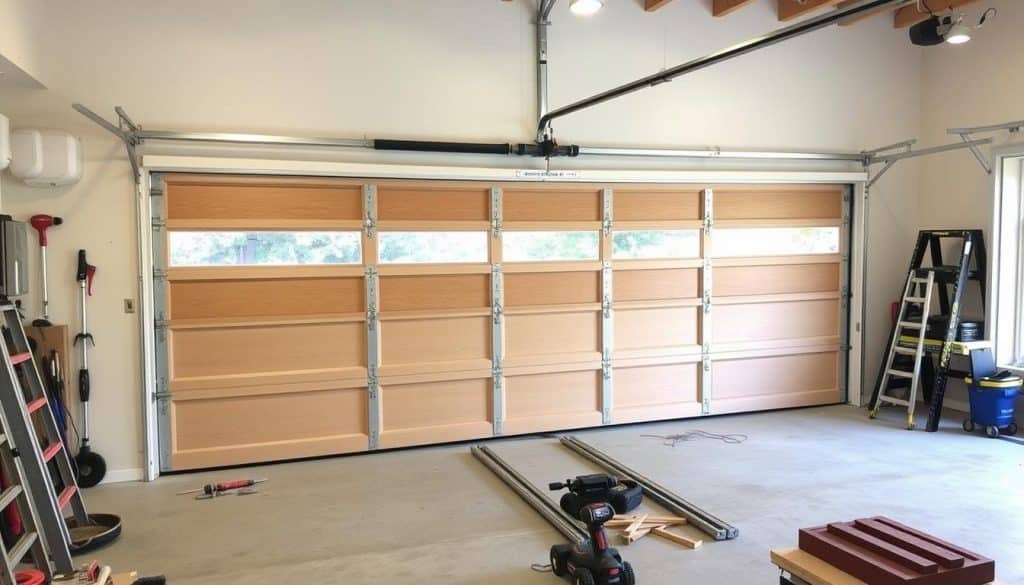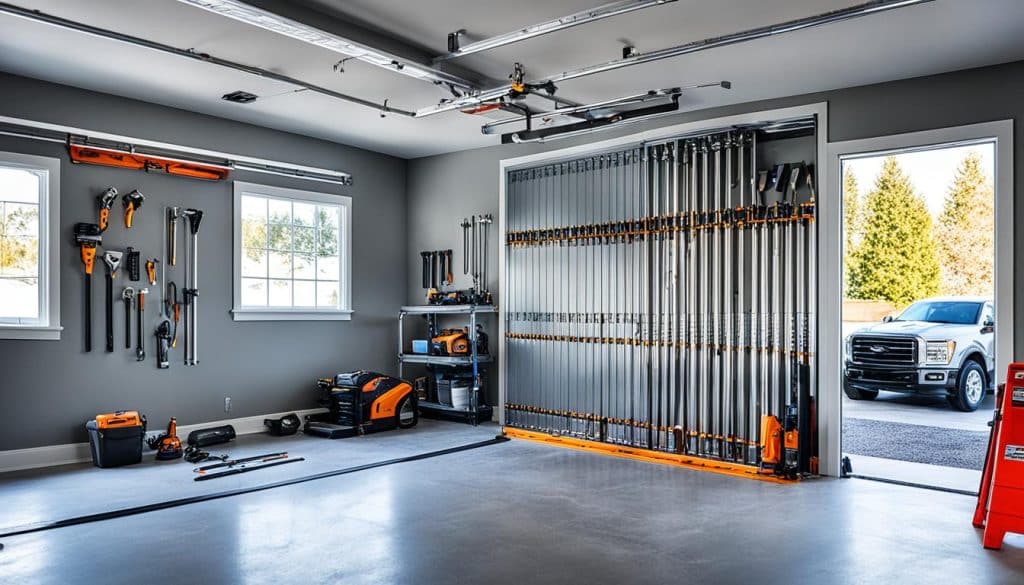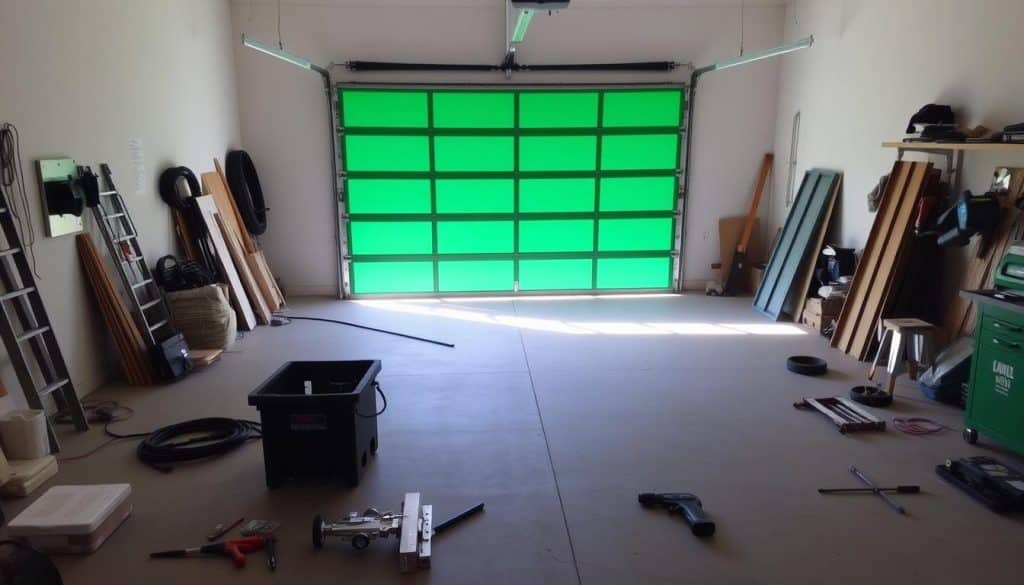Thinking about replacing your garage door but unsure if you can do it yourself? Many people are looking at DIY options as professional installation costs rise. But is it safe to try this on your own, or should you leave it to the pros? If you’re considering a DIY project, you might wonder, ‘Can I install a garage door myself?’ to save on installation costs.
Installing a garage door yourself is not only doable but can also be very fulfilling. Just make sure to follow all safety rules and guidelines carefully. While most cases allow for DIY installation, some issues might need a pro’s help. These include missing tools, complex garage setups, electrical problems, or water leaks.
The main advantages of DIY installation are saving money, having control over your schedule, and learning more about your garage door.
Key Takeaways
- DIY garage door installation can be a cost-effective solution.
- Safety precautions are key during self-installation.
- Having the right tools and understanding garage door hardware is important.
- Some situations may require professional intervention.
- Understanding the functionalities of your garage door adds value.
- Flexibility with your schedule is a significant benefit of DIY installation.
Understanding the Basics of Garage Door Installation
Thinking about installing a garage door yourself? It’s key to know the basics. This includes understanding different types of garage doors, the tools you’ll need, and common problems you might face.
Types of Garage Doors
There are many garage door types, each with its own benefits and needs. Roller doors are great for small spaces because they save room. Sectional doors are strong and keep your garage warm or cool.
Choosing the right type can make your project easier.
Required Tools and Materials
Getting the right tools is vital for a DIY garage door installation. You’ll need a level, safety glasses, pliers, and a drill. Using quality materials and tools helps avoid delays and makes the job smoother.
Common Challenges and Obstacles
DIY garage door projects can have many challenges. You might face tricky layouts, electrical problems, or lack the right tools. Knowing these issues ahead of time helps you plan better.
Talking to Emerald Garage Door Services in Orlando, FL, can offer great advice. They can help you overcome these obstacles.

Benefits of DIY Garage Door Installation
Installing your garage door yourself has many benefits. It can save you money and help you learn about garage door mechanics.
Cost Savings
One big advantage is saving money. Hiring a professional can be pricey. But, doing it yourself can save you cash. You can then use that money for other home projects.
Flexibility with Your Schedule
Another great point is the flexibility. You can work at your own speed. This is perfect for those with tight or changing schedules.
Learning the Functionalities
Also, you’ll learn a lot about garage door mechanics. This knowledge is useful for future maintenance. It helps you keep your garage door in good shape.
Necessary Tools and Supplies for Installing a Garage Door
Installing a garage door requires more than just a kit. You also need essential DIY tools. The right tools are vital for a safe and successful job.
Basic Tools
You’ll need a level for accuracy and adjustable-locking pliers for grip. A drill is needed for holes. Socket bits, a Phillips driver bit, wrench, hammer, and rods are also essential. Emerald Garage Door Services emphasizes the importance of these tools for a smooth install.
Safety Equipment
Wearing the right safety gear is key. Safety glasses protect your eyes from debris and hazards. The right gear makes the job safer and better.
Step-by-Step Guide to Installing a Garage Door Yourself
Installing a garage door yourself can save money and be rewarding. By following these steps, you can do it safely and efficiently. You’ll learn how to install a sectional garage door.
Releasing the Garage Door Tension
The first thing to do is release the tension in the springs. This is very important to avoid accidents. Use winding bars to unwind the tension on the torsion spring, following the instructions for your setup.
Disconnecting the Current Door from the Opener
After releasing the tension, disconnect the old door from the opener. Pull the emergency release cord and remove any connected parts. Make sure all electrical connections are safely removed and set aside.
Installing the New Sectional Garage Door Panels
Now, start installing the new sectional garage door panels. Begin at the bottom and work your way up. Make sure each panel is perfectly aligned for smooth operation.

Securing Hinges and Installing Tracks
First, attach the hinges to each panel as instructed. Then, connect the panels. Next, install the tracks. Place and secure the vertical and horizontal tracks around the frame for smooth movement.
Attaching Springs and Torsion Rods
The final step is attaching the torsion springs and rods. This is a detailed process. Make sure the torsion spring installation is done correctly to avoid any issues. Follow the guidebook for your door model for extra safety and stability.
By following each step carefully, you can successfully install your garage door. It will work smoothly and safely. Always check the garage door instructions specific to your model for the best results.
Safety Risks and Precautions for DIY Garage Door Installation
When you decide to install a garage door yourself, knowing the safety risks is key. It’s important to keep safety in mind to avoid injuries and make the installation go smoothly.
Handling Garage Door Springs
Working with garage door springs is risky because they can suddenly release a lot of tension. It’s vital to handle them carefully to prevent accidents. Always be careful and use the right tools to control the tension. For more safety tips, check out Emerald Garage Door Services.
Using Tools Safely
Using tools correctly is key in any DIY project. Using tools wrong can cause accidents and injuries. Always follow the instructions and use each tool as it’s meant to be used. Wearing the right protective gear can also help keep you safe.
When to Call a Professional for Garage Door Installation
DIY garage door installation can be rewarding. But, there are times when you need a pro. Knowing when to call a professional saves time, ensures safety, and gives you peace of mind.
Complex Garage Layouts
Complex garage structures can be tough to handle without the right skills. A professional can handle these challenges easily. They ensure your garage door fits perfectly and works well.
Electrical Issues
Garage doors often have electrical parts, like automatic openers. These need special skills and safety knowledge. Experts, like those at Emerald Garage Door Services, can handle these safely.
Ensuring Proper Installation and Safety Inspections
Proper installation is key for your garage door’s life and function. Pros do thorough safety checks. They make sure your door works right and safely.
Companies like Emerald Garage Door Services, founded by James Balfe, offer licensed, insured, and bonded experts. They ensure installations meet high safety standards.

FAQ
Can I install a garage door myself?
Yes, you can install a garage door by yourself. Just make sure to follow safety rules and guidelines carefully. It’s important not to take shortcuts to avoid accidents or mistakes.
What are the main types of garage doors?
There are mainly two types of garage doors: roller doors and sectional doors. Each type needs its own installation steps and tools.
What tools and materials are required for garage door installation?
You’ll need a level, adjustable-locking pliers, drill, and socket bit. Also, a Phillips driver bit, wrench, hammer, and rods are essential. Don’t forget safety glasses for protection.
What common challenges might I face during DIY garage door installation?
You might face challenges like different garage layouts or unexpected electrical issues. You might also lack the right tools.
What are the benefits of DIY garage door installation?
DIY installation can save you a lot of money. It also gives you the freedom to work at your own pace. Plus, you’ll learn a lot about your garage door, which helps with future care.
How do I release the garage door tension?
First, carefully release the torsion spring tension. Do this step by step to avoid getting hurt.
How do I disconnect the current door from the opener?
Start by disconnecting the door from the opener. Make sure the door is closed and the opener’s power is off.
How do I install new sectional garage door panels?
Follow the guidebook for your model to install the new panels. Make sure each panel fits well and is aligned right.
How do I secure hinges and install tracks?
Secure the hinges and install the tracks correctly. This ensures your garage door works well. Always follow the manufacturer’s instructions.
How do I handle attaching springs and torsion rods?
Attach the springs and torsion rods carefully. Keep the tension as the guidebook says. This completes the installation.
What safety risks should I be aware of when handling garage door springs?
Garage door springs are very dangerous because of their high tension. Be very careful when handling them to avoid injury.
What precautions should I take when using tools?
Always use tools safely and as directed. Wear safety glasses to protect yourself from possible dangers during the installation.
When should I call a professional for garage door installation?
Call a professional if you have a complex garage layout or electrical problems. They can also ensure your garage door is installed safely and correctly. It’s safer to let them handle tricky situations.

